Mobile charging solutions have transformed traditional fuel delivery concepts for electric vehicles, offering on-demand charging services for stranded or low-battery situations. Professional providers now deploy portable DC Fast Charging units capable of delivering up to 80kW per port, enabling rapid charging in approximately 30 minutes for most EVs. These services integrate advanced energy storage systems and can simultaneously service multiple vehicles at various locations, including festivals, construction sites, or emergency roadside assistance scenarios. Weather conditions and location accessibility may affect service delivery times and charging speeds, but technological innovations continue expanding the reliability and efficiency of mobile charging solutions. Understanding the complete spectrum of available charging options helps EV owners maximize their vehicle's potential.
Expert Highlights
- Electric vehicles primarily rely on charging stations rather than traditional fuel delivery services, with home charging being the most common method.
- Mobile charging solutions can provide emergency power with up to 80kW DC fast charging capability for stranded electric vehicles.
- Most EV owners charge overnight at home using Level 2 chargers, which typically provide 10-75 miles of range per hour.
- Public charging networks offer widespread access through companies like ChargePoint and Electrify America for on-the-go charging needs.
- Weather conditions significantly impact charging efficiency, with cold temperatures potentially reducing charging speeds by up to 300%.
Understanding Electric Vehicle Energy Sources
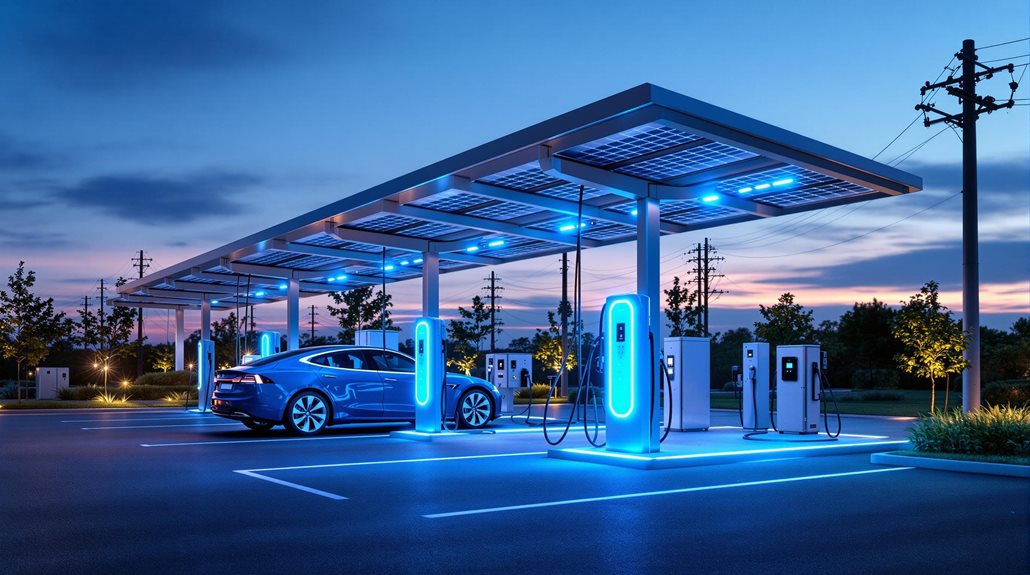
Nearly all electric vehicles rely on advanced energy storage systems, with lithium-ion batteries being the predominant technology in modern EVs. These sophisticated batteries, available in various chemistries including NMC, LFP, and NCA, efficiently store electrical energy to power the vehicle's electric motors. Fast charging infrastructure is rapidly expanding worldwide to support the growing EV adoption. Level II charging at home provides a convenient overnight refueling option for most EV owners.
While batteries remain the primary energy source, alternative technologies are emerging in the electric vehicle sector. Hydrogen fuel cells, which generate electricity through chemical reactions producing only water vapor as a byproduct, represent a promising alternative. Additionally, supplementary systems such as ultracapacitors and ultrahigh-speed flywheels can enhance energy storage capabilities. New roadside assistance options for lockout service, including locksmithing, are also becoming available for EVs. These technologies work in conjunction with regenerative braking systems, which capture and store energy typically lost during deceleration, considerably improving overall vehicle efficiency and extending operational range between charging sessions.
Home Charging Setup Basics
Most electric vehicle owners opt for home charging setups as their primary means of replenishing their vehicles' batteries. Understanding the available charging options is essential for making informed decisions about home charging infrastructure. Tesla owners receive a versatile plug-in charger that works with both 120V and 240V outlets.
Level 1 charging, which utilizes standard 120-volt outlets, provides basic charging capabilities but requires extended charging periods, while Level 2 charging delivers expeditiously faster charging times through 240-volt connections. Level 2 systems can fully charge most vehicles in 4-5 hours. There are also opportunities to access 24/7 roadside assistance services in Minnesota that complement the charging options.
Installing a Level 2 charging system typically requires professional expertise from a certified electrician who can verify proper electrical requirements are met, including potential panel upgrades and permit acquisitions. The installation process involves strategic placement considerations, appropriate cable length selection, and compliance with safety standards.
While initial setup costs can range from $400 to $1,000 for the charging unit alone, various incentives and rebates may help alleviate these expenses.
Public Charging Station Networks
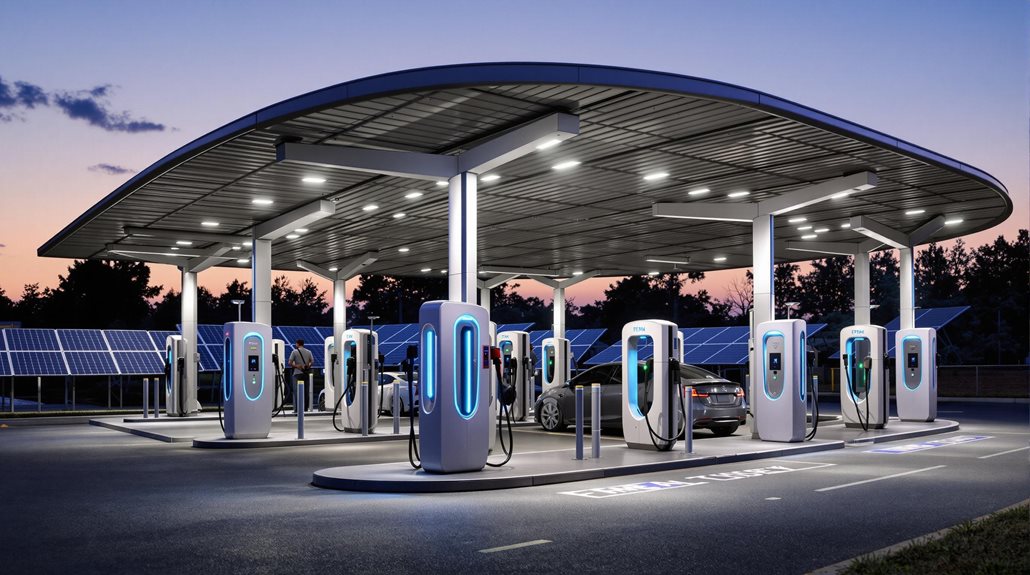
As electric vehicle adoption continues to accelerate, public charging station networks have emerged as a critical component of the EV charging infrastructure landscape. These networks, operated by various entities including ChargePoint, Electrify America, and Shell Recharge, provide essential charging solutions through diverse business models and partnerships. The integration of advanced technology enables rapid charging capabilities and all-encompassing mobile applications for user convenience. Payment methods include credit cards, mobile apps, and RFID cards for flexible charging access.
ChargePoint leads the market with nearly 49,000 charging ports across 15,454 locations, offering extensive coverage. DC fast charging stations deliver 100-200+ miles of range in approximately 30 minutes. Networks often partner with retail locations and shopping centers, enhancing accessibility while providing site hosts with technical expertise. A reliable service provider ensures efficient and trustworthy assistance in various car-related emergencies.
This infrastructure continues to evolve through innovative partnerships, renewable energy integration, and expanding coverage areas, ensuring reliable charging solutions for EV drivers nationwide.
Cost Comparison With Traditional Fuels
Through detailed analysis of operating costs, electric vehicles demonstrate significant fuel cost advantages over traditional gasoline-powered vehicles, with EVs averaging $485 in annual fuel expenses compared to $1,117 for conventional vehicles. When examining per-mile costs, EVs can operate for as little as 11.4¢ per mile during off-peak charging, while gasoline vehicles typically cost around 21¢ per mile at current fuel prices. This cost advantage extends to luxury electric vehicles, which average $13.50 per 100 miles when charged primarily at home, compared to $17.56 for equivalent internal combustion models. The efficiency disparity becomes even more apparent when considering that EVs convert approximately 77% of their energy into motion, while gasoline engines typically achieve only 12-30% efficiency, with most energy lost as heat. In addition to fuel cost savings, some roadside assistance services also offer on-site gas delivery and other support specifically tailored for electric vehicles, enhancing convenience for EV owners.
Range Planning And Management
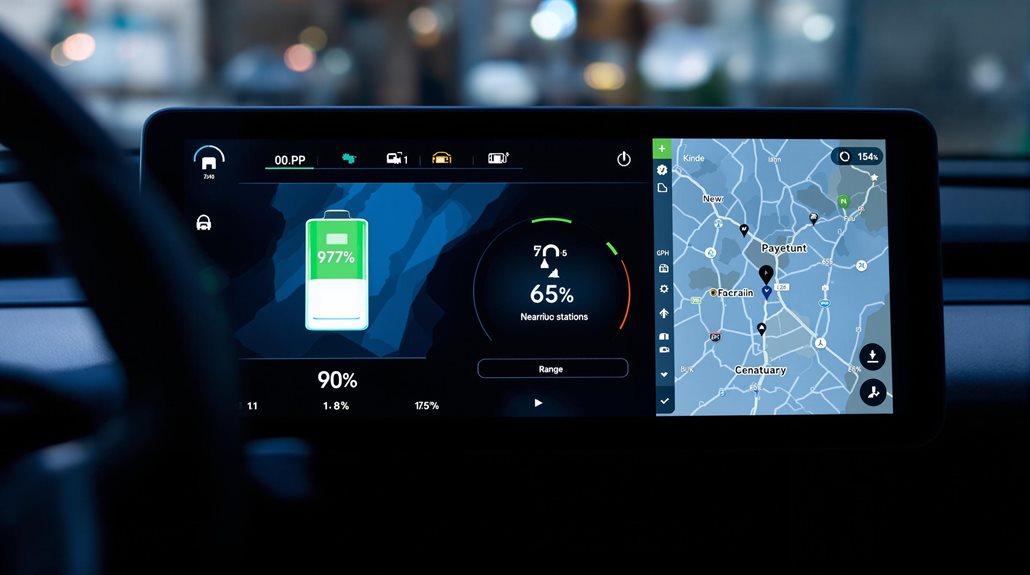
Effective range planning and management are crucial elements for maximizing the utility of electric vehicles during both short and long-distance travel. Advanced route planning systems, incorporating real-time data and intelligent algorithms, enable drivers to optimize their journeys by considering factors such as terrain, elevation changes, and charging station availability.
These sophisticated tools work in conjunction with efficient driving techniques and proper vehicle maintenance to guarantee optimal range performance.
Utilize specialized navigation systems like BMW's eRoute to automatically integrate charging stops along your journey. Implement smooth driving techniques and maintain steady speeds while avoiding aggressive acceleration. Monitor and maintain proper tire pressure while minimizing unnecessary vehicle load to reduce energy consumption. Seeking professional service for routine checks ensures all components are functioning efficiently, mitigating potential issues.
Through strategic implementation of these range management practices, EV owners can considerably enhance their vehicles' efficiency and travel capabilities while reducing range anxiety and operational costs.
Charging Speeds And Options
Electric vehicle charging technology offers three distinct levels of charging speeds and options, each suited to different scenarios and requirements. Level 1 charging utilizes standard 120V outlets, providing a convenient but slower charging solution for overnight home use. Level 2 charging, operating at 240V, delivers considerably faster charging speeds suitable for both residential and commercial applications. Direct Current Fast Charging (DCFC) represents the pinnacle of charging technology, capable of delivering substantial power directly to the vehicle's battery. While considering charging options, roadside assistance services in Dinkytown MN offer crucial support for electric vehicle drivers.
| Charging Level | Power Output | Typical Charging Time | Common Locations | Range Added |
|---|---|---|---|---|
| Level 1 | 1-1.8 kW | 40-50 hours | Residential | 3-5 miles/hour |
| Level 2 | 3-19 kW | 4-10 hours | Home/Public | 10-75 miles/hour |
| DCFC | 50-350+ kW | 20-60 minutes | Highway Corridors | 3-20 miles/minute |
| Tesla Supercharger | Up to 250 kW | 15-45 minutes | Proprietary Network | 5-25 miles/minute |
| Ultra-Fast DC | 350+ kW | 15-30 minutes | Select Locations | 10-30 miles/minute
Weather Impact On Charging
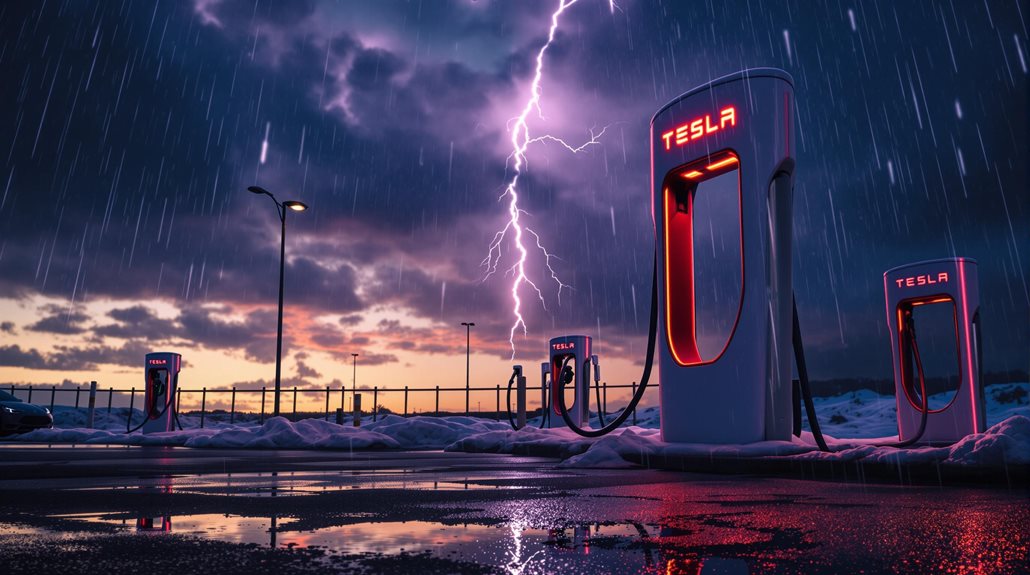
Weather conditions markedly influence the performance and efficiency of EV charging systems, with both extreme cold and heat presenting distinct challenges. Cold temperatures profoundly slow charging rates, potentially tripling charging times at 32°F, while extreme heat can accelerate battery degradation. Understanding these impacts helps EV owners optimize their charging strategies and maintain battery health through varying seasonal conditions.
Cold weather reduces EV range by 20-40% due to slower chemical reactions and increased power consumption for cabin heating. Hot temperatures can decrease range by up to 30% and require strategic charging during cooler periods. Pre-conditioning the battery and utilizing sheltered charging locations helps mitigate weather-related efficiency losses.
To maximize charging efficiency, owners should implement temperature-specific strategies, such as garage charging in extreme weather and more frequent charging sessions during cold periods. Regular maintenance and monitoring of charging equipment become particularly vital when operating in challenging weather conditions.
Mobile Charging Solutions
Mobile charging solutions represent a significant advancement in addressing the evolving needs of EV owners, particularly when traditional charging infrastructure or weather-protected stations are unavailable. These versatile units, available as mobile vans, trailers, and truck-mounted systems, offer DC Fast Charging capabilities with outputs up to 80 kW per port and can service multiple vehicles simultaneously.
The systems incorporate high-efficiency charging modules and advanced energy storage options, enabling rapid charging in approximately 30 minutes for most EVs. Their flexible deployment capabilities make them invaluable for various scenarios, including festivals, construction sites, and emergency roadside assistance. Additionally, these mobile units support multiple charging protocols through interchangeable cables, ensuring compatibility with diverse vehicle types while maintaining charging efficiency rates of 95% or higher.
Smart Charging Technologies
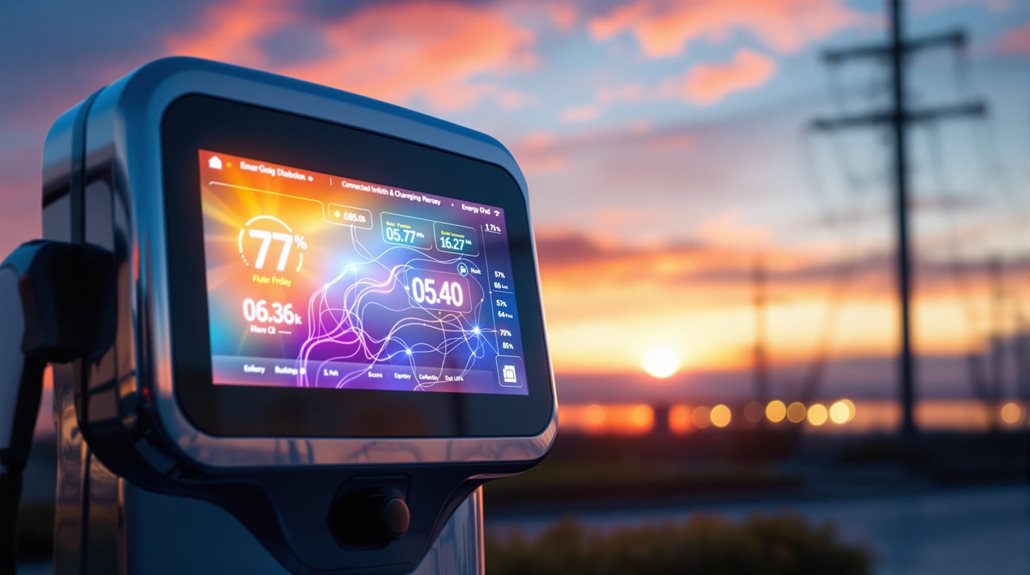
Smart charging technologies represent a significant advancement in electric vehicle infrastructure through sophisticated peak load management systems that distribute power efficiently across charging networks during high-demand periods.
These systems integrate automated charging schedules that optimize energy consumption by coordinating charging times with off-peak electricity rates and renewable energy availability. The incorporation of remote monitoring solutions enables real-time oversight of charging stations, allowing operators to track performance metrics, diagnose issues promptly, and guarantee reliable service delivery across the charging network.
Peak Load Management Systems
Peak load management systems represent a critical component in the evolution of electric vehicle charging infrastructure, offering sophisticated solutions to balance power distribution and prevent grid overload. These advanced systems utilize real-time monitoring and dynamic adjustments to maximize power allocation across multiple charging stations while maintaining grid stability and preventing costly infrastructure upgrades.
Intelligent power distribution algorithms continuously monitor and adjust charging rates to prevent system overload while ensuring ideal charging efficiency. Integration with time-of-use pricing mechanisms allows for cost-effective charging during off-peak hours, potentially saving billions in operational costs.
Automated load balancing enables seamless scaling of charging infrastructure without immediate need for extensive grid modifications.
Automated Charging Schedules
Through advanced automation and machine learning algorithms, automated charging schedules represent a transformative leap in electric vehicle charging technology. These sophisticated systems integrate real-time vehicle data, including state of charge and remaining range, to optimize charging patterns while preserving battery health. The technology employs complex algorithms, from Genetic Algorithms to Deep Reinforcement Learning, enabling precise control over charging operations.
Users can customize their charging preferences by setting specific parameters such as desired charge levels, completion times, and cost thresholds. The system then automatically governs the charging process, considering factors like electricity rates, renewable energy availability, and grid conditions. This intelligent orchestration guarantees vehicles reach their target charge levels within specified timeframes while minimizing energy costs and reducing peak load demands on the power grid.
Remote Monitoring Solutions
Remote monitoring solutions represent three critical pillars of modern EV charging infrastructure: real-time control, preventive maintenance, and energy optimization.
These sophisticated systems enable all-encompassing oversight of charging operations through secure internet connectivity, allowing operators to track, analyze, and manage charging sessions with unprecedented precision.
Real-time monitoring capabilities provide instant updates on charging status, energy consumption, and potential system abnormalities. Predictive maintenance algorithms analyze charging data to identify potential issues before they escalate into major problems.
Advanced energy management features optimize charging schedules during off-peak hours, potentially reducing electricity costs by up to 45%.
Through centralized platforms, operators can efficiently manage multiple charging stations while ensuring secure, scalable operations that adapt to growing infrastructure demands, ultimately delivering reliable and cost-effective charging solutions for the expanding electric vehicle ecosystem.
Emergency Power Solutions
During emergencies and unexpected power outages, electric vehicle owners have access to several innovative solutions designed to manage power-related challenges. Mobile charging solutions deliver high-powered DC fast charging, providing approximately one mile of range per minute through modular systems that accommodate various energy requirements. These portable units can be rapidly deployed by roadside assistance vehicles to serve stranded EVs.
Emergency plugs offer an additional layer of security by implementing sophisticated safety protocols. These devices simulate charging processes to prevent accidental movement, activate parking brakes, and maintain essential vehicle functions while ensuring compliance with UN ECE R100 regulations. Compatible with most type 1 and type 2 charging ports, these systems provide continuous visual feedback through LED indicators while allowing access to necessary electrical systems like windows and lights.
Roadside Assistance FAQ
Can Electric Vehicle Batteries Be Recycled or Disposed of Safely?
Electric vehicle batteries can be safely recycled through pyrometallurgy, hydrometallurgy, or direct recycling methods, recovering valuable minerals while minimizing environmental impact. Proper handling prevents fire risks and chemical hazards.
How Long Does an Electric Vehicle's Battery Typically Last Before Replacement?
EV batteries typically last 10-20 years or 200,000-300,000 miles under normal conditions. With proper maintenance and care, including ideal charging habits, many owners never need a replacement during vehicle ownership.
Do Electric Vehicles Require Special Insurance Coverage?
Electric vehicles share standard coverage options with gas vehicles but often require full coverage due to higher repair costs. Many insurers offer specialized EV discounts and additional services like charging-related assistance.
What Happens if My Electric Vehicle Runs Out of Charge Mid-Journey?
When your EV runs critically low, it enters 'Turtle Mode' with reduced speed. If completely drained, you'll need roadside assistance or towing to the nearest charging station for recovery.
Can Charging an Electric Vehicle Damage My Home's Electrical System?
Improper EV charging can strain your home's electrical system. Having a certified electrician install a dedicated circuit and charging station guarantees safe operation without risking damage to your home's wiring.
